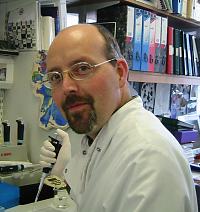
Dr Stephen McLaughlin
Position: Biophysicist
Personal home page:
http://www2.mrc-lmb.cam.ac.uk/
PubMed journal articles - click here
I have expertise in a wide range of biophysical techniques to characterise protein-protein and protein-ligand interactions to understand complex formation and aid assay development. I am also interested in the mechanism of the abundant, cytosolic heat shock protein 90 (Hsp90), a molecular chaperone whose activity is crucial for the maintenance of the transformed state. Hsp90 faciliatates the activation and assembly of oncogenic proteins involved in key regulatory pathways in cancer including kinases, polymerases and transcription factors. Consequently, Hsp90 is now regarded as an important therapeutic target. There are several Hsp90 directed anti-tumour drugs in development and clinical trials.
Surface plasmon resonance Isothermal titration calorimetry Fluorescence: steady-steady state and stopped-flow Circular dichroism Fluorescence polarisation assays Small-molecule microarrays Analytical Ultracentrifugation
Symplectic Elements feed provided by Research Information, University of Cambridge
McLaughlin S.H., Sobott, F., Yao, Z.-P., Zhang, W., Nielsen, P.R., Grossmann, G. J., Laue, E.D., Robinson, C.V., and Jackson, S.E. (2006) The co-chaperone p23 arrests the Hsp90 ATPase cycle to trap client proteins. J. Mol. Biol. 356: 746-758 McLaughlin, S.H., Ventouras, L.-A., Lobbezoo, B., and Jackson, S.E. (2004) Independent ATPase activity of Hsp90 subunits creates a flexible assembly platform. J. Mol. Biol. 344: 813-826. McLaughlin, S.H., Smith, H.W., and Jackson, S.E. (2002) Stimulation of the weak ATPase activity of human Hsp90 by a client protein. J. Mol. Biol. 315, 787-798.















